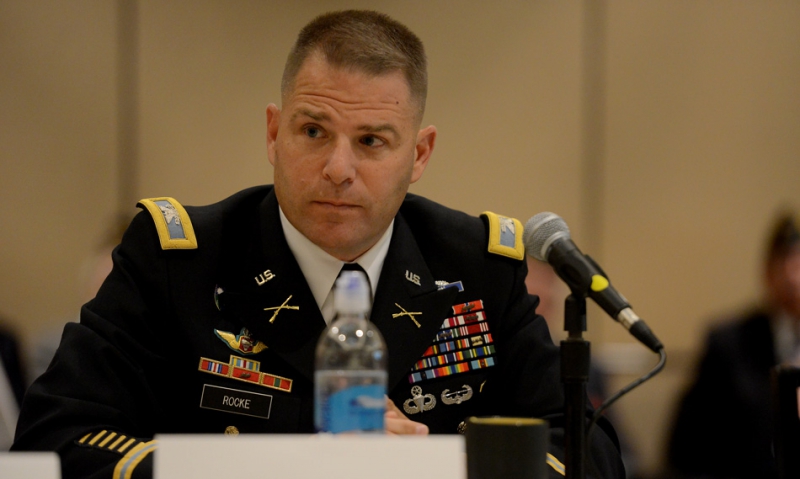
Veterans Employment & Education Commission meeting at national convention featured a panel that examined challenges transitioning servicemembers encounter and how Legionnaires can help.
In less than four years, the U.S. Chamber of Commerce has hosted 775 Hiring Our Heroes job fairs with assistance from The American Legion at the national and local level. “In my personal perspective, out of all the veterans service organizations, the Legion is the tip of the spear when it comes to veteran employment issues,” said Eric Eversole, vice president of the Chamber's Hiring Our Heroes program.
Eversole was one of five panelists speaking on employment challenges servicemembers encounter upon transitioning out of the military during the Veterans Employment & Education Commission roundtable employment panel at the 96th National Convention in Charlotte, N.C., on Aug. 23.
“Many young veterans don’t understand what an economic opportunity looks like today in this country," Eversole said. "They do their four years and think ‘What’s next?’ We (U.S. Chamber of Commerce) as an organization are telling that story of what economic opportunity looks like in this country so that servicemembers may make informed decisions about where that long-term employment is. This is an area where I think we need to keep plugging away so servicemembers and their families understand where they can succeed after the military.”
Rosye Cloud, senior advisor for veteran employment at the Department of Veterans Affairs, said 280,000 servicemembers transition out every year and about 40 percent never receive transition assistance. With those numbers announced, Army Col. Adam Rocke, special assistant to chief of staff, Army Soldier for Life program in Arlington, Va., stressed that over the past several years, “the Army has taken transition seriously, focusing on credentialing, and on making the soldiers more educated in effort to earn certifications, credentials and licenses. In the last two years, we have certified just over 12,000 servicemen and women with some sort of credentialing. That leads to skilled work, better jobs and an opportunity for employment when they get out.”
Rocke also added that the Army identified leadership and mentorship as areas of weakness. To improve upon those weaknesses, the Army now has a mentorship program for young soldiers and officers that counsels on what the soldier may want to do for employment after service and what other life needs they may have upon leaving. “However, it is still the soldier’s responsibility to decide at some point in time during their military service what they want to do afterward,” Rocke said.
Throwing out more statistics, Cloud said that one out of every two transitioning servicemembers is unemployed and that the majority of servicemembers are not using the GI Bill. “We have one of the richest GI Bill’s in history, and we have a huge gap on who is actually taking advantage of it,” she said. “Most of the job growth and opportunities for them is in credentialing and that middle skills gap, so together we can give good coaching and mentorship advice to these men and women and talk about what the labor market looks like, what their skill set is and are they using their GI Bill.”
The panelist ended the discussion with ways Legionnaires at the local level can help transitioning servicemembers find employment.
“If you want to help a servicemember find employment, one of the biggest things they have a challenge with is that power speech, that 30-second elevator speech to the civilian employer,” Eversole said. “They have challenges with that because of their military training – they have all been taught not to talk about themselves but about their unit.”
Eversole also tasked Legionnaires with asking their local businesses that they consult with if they hire veterans and challenge them to hire a veteran within the next year. “It’s a simple question, but it makes a profound impact if the local businesses that you are dealing with knows that you are serious about hiring veterans,” he said. “What we know is that businesses that have veterans working inside of them continue to hire veterans. Why? They are great employees.”
While it is one thing to hire a veteran, it’s “a totally different thing to keep them,” Eversole said. “What I have found with veteran retention is to make sure those veterans have a sense of mission in their business, and that the business understands their service and sacrifice.”
Hakeem Basheerud-Deen, director of veterans services at the Office of Personnel Management, asked the Legionnaires to educate themselves on federal employment by visiting www.vetshirevets.gov. The website is dedicated to employment information for veterans, servicemembers and their families.
Marine Lt. Col. Leland Suttee, commanding officer for the Wounded Warrior Battalion East at Camp Lejeune in North Carolina, closed the meeting with words of praise to the Legion.
“Your efforts are bigger than just helping a Marine (or any servicemember) land a job; it represents a future, it represents hope, there is self-worth,” he said. “I can’t thank you enough for what you’re doing.”
- Careers

